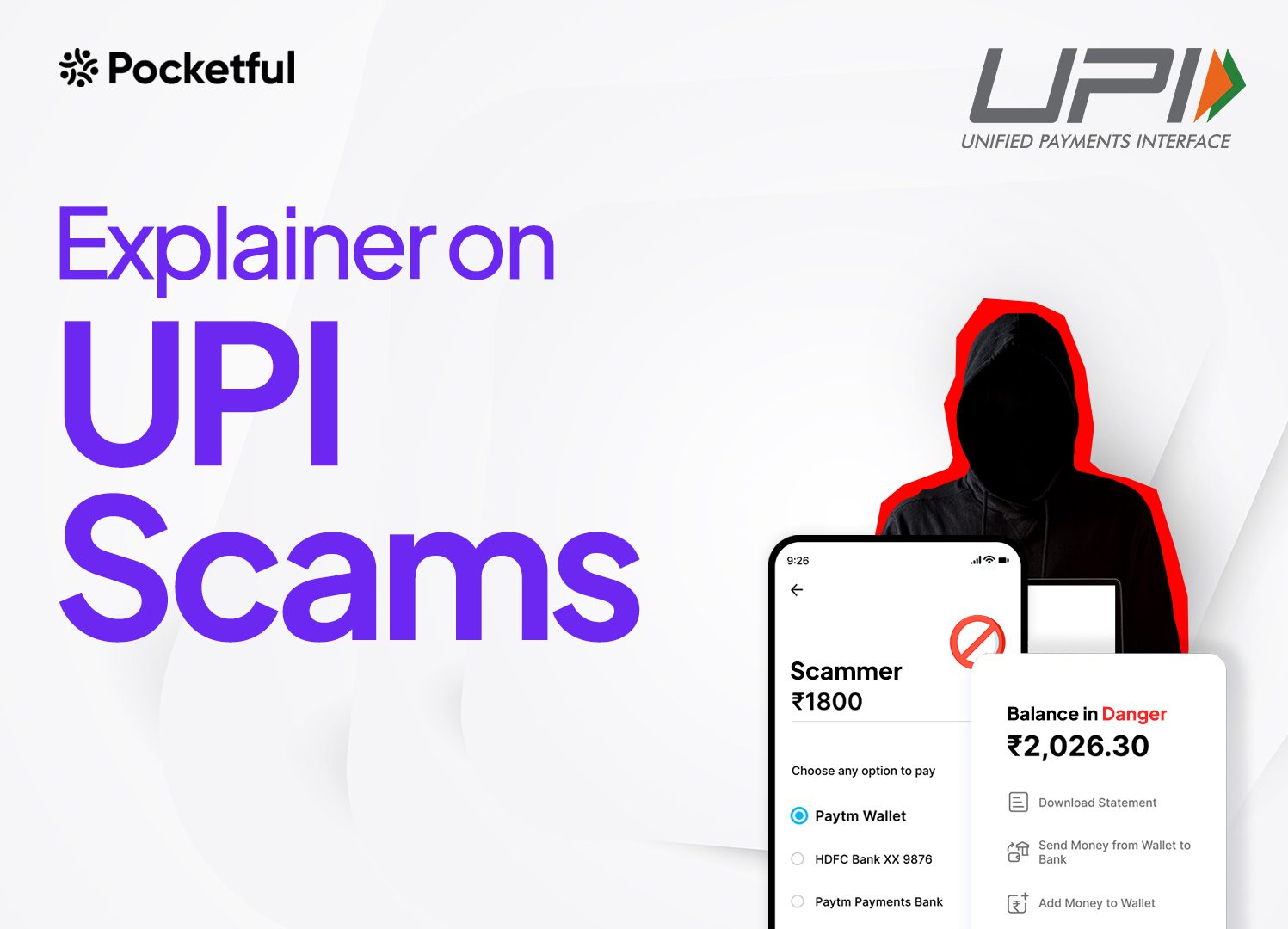| Type | Description | Contributor | Date |
|---|---|---|---|
| Post created | Pocketful Team | Apr-05-24 | |
| Add new links | Nisha | Feb-24-25 |

- Blog
- explainer on upi scams latest scams economic data government actions and prevention tactics
Explainer on UPI Scams: Latest Scams, Economic Data, Government Actions, and Prevention Tactics

Have you ever received a suspicious call about your UPI account? Or a message claiming an undelivered package requiring an urgent payment? If so, you are not alone. UPI scams are on the rise in India, and it is important to know the tricks scammers use to steal your hard-earned money.
Today’s blog will explore the latest UPI scams and provide essential tips for protecting yourself.
UPI Scams Overview
UPI scams are deceptive tactics that exploit the Unified Payments Interface (UPI) system to steal money from users. These scams can trick you into revealing sensitive information or initiating unauthorized transactions.
Scammers use several methods to manipulate you. They might pose as a trusted source like your bank, a seller, or even a friend. Their ultimate goal is to get your UPI PIN or OTP (one-time password). Once they get this, they can transfer funds from your account without your permission.

Latest Scams
Below are some of the latest tactics used by scammers:
Fake Customer Care Scams
This scam involves impersonation. Scammers pretend to be customer service representatives from your bank or a popular online retailer. They might call you, claiming suspicious activity on your account or undelivered products. The goal is to pressure you to share your UPI PIN or OTP.
QR Code Scams
Malicious QR codes can be placed strategically to trick you. These codes could be on posters, websites, or even physical receipts. Scanning such a code could lead you to a fake UPI payment page or download malware that can steal your credentials.
Fake Investment Schemes
Fraudulent investments offering promising high returns are a common trap. Scammers might reach out through social media or messaging apps. They can be very convincing, so be wary of unsolicited investment advice and always research thoroughly before transferring any funds.
SIM Cloning
While not entirely new, SIM cloning is a growing concern. Scammers can get a duplicate SIM card with your phone number. This could allow them to intercept UPI notifications and verification codes, enabling unauthorised transactions.
Fake Delivery OTP Scam
This is a common tactic used by fraudsters to steal money through UPI. In this scam, you will receive a call from the fraudster impersonating a delivery agent. They would then create a sense of urgency by stating a delivery attempt was unsuccessful due to your absence or an incorrect address. The scammer will then ask for the OTP to reschedule the delivery or verify your information. The OTP that you will receive is actually for a UPI transaction.
Phishing
It is an attempt to steal sensitive information, generally usernames and passwords, credit card details, or any other personal data, by pretending to be a legitimate source. Phishing scams can target you through various channels, including email, text messages, phone calls and even social media. This could be an email that looks like an email from your bank or even a fake website designed to mimic a popular online service.
UPI Scams Economic Data
In 2022-23, 95,000 cases of UPI fraud were reported, up from 84,000 in 2021-22.
55% of digital payment frauds in India are related to UPI transactions, and almost half of cybercrime cases since 2020 have been linked to UPI.
While UPI boasts built-in security features, a few users unfortunately fall victim to social engineering scams.
| Year | Count of cases | Fraud-to-Sales Ratio (value terms) |
|---|---|---|
| 2020-21 | 77,299 | 0.0017% |
| 2021-22 | 84,274 | 0.0016% |
| 2022-23 | 95,402 | 0.0015% |
Note – The fraud-to-sales ratio is a metric used to measure the percentage of fraudulent transactions compared to the total volume of transactions in a given period.
Even though the number of UPI fraud cases has increased, the fraud-to-sales ratio remains very low, indicating that most UPI transactions are safe. However, this does not eliminate the importance of being aware of scammers’ social engineering tactics.
Read Also: Financial Scams in India: Types, Resolution, and Awareness
UPI Scams Government Actions
The Indian government is aware of the rising problem of UPI scams and is taking steps to combat them. Let us have an overview:
- The RBI issues guidelines and regulations for UPI transactions to strengthen security measures and improve fraud detection.
- The government has formed an Inter-Ministerial Committee on phone frauds, which brings together various stakeholders like the Ministry of Electronics and Information Technology, the Department of Financial Services, and law enforcement agencies to work collaboratively on preventing online financial frauds, including UPI scams.
- RBI and NPCI run public awareness campaigns to educate users about UPI scams. These campaigns include informative videos, posters and social media messages.
- The Central Government has also launched the National Cyber Crime Reporting Portal, www.cybercrime.gov.in, to enable victims to report complaints about all cybercrimes, including net and online frauds.
To sum it up, the government is consistently addressing UPI scams, but it is a continuous battle. So, you need to be vigilant and follow safe UPI practices.

Prevention Tactics
- Treat your UPI PIN and OTP with the same care you would for your ATM PIN. Never, ever share them with anyone. Banks and legitimate businesses will never ask for this information.
- Before approving any UPI transaction, meticulously analyse the recipient’s details. Verify the name and UPI ID; do not rely solely on nicknames or familiar-sounding names.
- Scammers often impersonate customer service representatives or sellers. If you receive a call or message requesting urgent UPI payments or claiming suspicious activity on your account, verify the sender’s identity directly with the bank or the company they claim to represent.
- Some messages often contain links that lead to fake websites designed to steal your money through UPI credentials. Therefore, do not click on links from unknown senders.
- Only download UPI apps from trusted sources like Google Play store or Apple App Store. Avoid downloading apps from untrusted websites or clicking on ads that promote them.
- Enable strong passwords or PINs for your phone as well as the UPI app. Consider two-factor authentication for additional security.
- Regularly monitor your UPI transaction history, look for any unauthorized transactions and report them to the bank immediately.
Read Also: Explainer on Imitation Investing
Conclusion
In today’s digital world, staying safe from UPI scams requires constant vigilance. Remember, knowledge is power; you can keep yourself safe by educating yourself and following safe practices. Do not hesitate to report suspicious activity to your bank and the authorities. Together, we can create a safer digital payment environment for everyone.
Frequently Asked Questions (FAQs)
What are UPI Scams?
UPI Scams are deceptive tricks that exploit UPI to steal money from users through fake transactions or extracting sensitive information.
What are some common UPI Scams?
Phishing messages, fake money requests, and unauthorized transactions are all common scams.
How can I protect myself from a UPI Scam?
Be cautious of unknown messages, double-check the recipient details, and download apps carefully to protect yourself.
Is using UPI safe?
UPI has built-in security features, but user awareness is important. Following safe practices minimise your risk.
What should I do if I suspect a UPI scam?
Do not respond to the scammer; immediately report the incident to your bank and change your UPI PIN if needed.
Disclaimer
The securities, funds, and strategies discussed in this blog are provided for informational purposes only. They do not represent endorsements or recommendations. Investors should conduct their own research and seek professional advice before making any investment decisions.